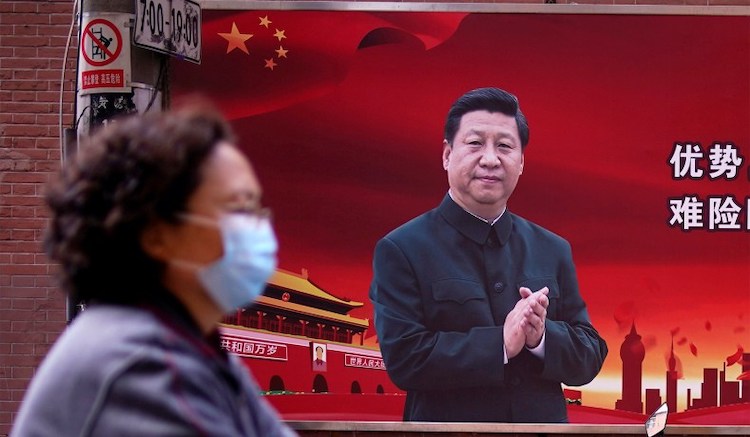Why Do Global Medical Institutions Trust China?
With the Communist country’s bloody record of forced organ harvesting, can we believe anything it says about its coronavirus efforts?

Why are international medical bodies accepting the Chinese Communist Party line? As the coronavirus spread from China across the world in January and February, the World Health Organization repeatedly praised Beijing’s efforts to contain it. The agency did so despite China’s censorship of medical professionals and evidence of undercounting deaths. As the second-largest donor to the United Nations, which oversees the WHO, China, it appears, has induced the agency to provide a veneer of legitimacy while it engages in cover-up, thereby worsening the global crisis.
Yet the coronavirus is not the only instance of the WHO’s credulity when it comes to Chinese claims. The same is true with China’s organ-transplant system. The evidence overwhelmingly indicates that China forcibly harvests organs from prisoners of conscience, most notably Falun Gong practitioners and Muslim Uighurs. Yet the WHO and the Transplantation Society (TTS), the profession’s global governing body, refuse to acknowledge this. Their silence has also given pause to human-rights organizations that may otherwise condemn China’s exploitation of innocents.
The Victims of Communism Memorial Foundation highlights this in a new report on China’s organ-harvesting system, released Tuesday. Drawing from internal and public Chinese archives and sources — many unearthed and translated for the first time — as well as undercover investigations, the report shows that none of Beijing’s explanations about where it obtains organs are credible. The report is authored by Matthew P. Robertson, a published scholar who has studied this issue both inside and outside China for nearly a decade and whose work using statistical forensics has previously demonstrated the falsification of Chinese organ-donor-registry data by the Chinese Communist Party.
Beijing has claimed since 2015 that all organs come from voluntary deceased donors. But the growth of the voluntary figures is highly questionable — rising from 34 in 2010 to 6,316 in 2016 — and follows a quadratic equation to the 99.9 percent level. Nor does it make sense that China can provide organs on demand, often within hours or days, from such a small population. Only forced organ harvesting of blood-typed prisoners can meet that timeline.
The report also shows that China transplants far more organs than authorities admit. Some 173 Chinese hospitals are currently authorized to do transplants, yet just ten hospitals account for nearly 14,000 annual procedures. The total number of transplants is likely at least several times larger. Beijing is falsifying both the number and the source of the organs it sells for profit.
These findings give further credence to the 2019 findings of the Independent Tribunal into Forced Organ Harvesting from Prisoners of Conscience in China and of the 2016 report Bloody Harvest / The Slaughter: An Update. When confronted with the evidence, the WHO and TTS invariably defend Beijing. Both organizations supported China’s transplant “reforms” in 2015 and regularly declare that China’s system is now ethical and unobjectionable.
The WHO’s leading transplant official said in 2019 that “China’s organ transplant reform has achieved remarkable results in a short period of time, and China’s experience can serve as a model for the entire Asian region and the world.” Dr. Francis Delmonico, chairman of the WHO transplantation task force, said in 2016 that “the media has to challenge those who are making such assertion[s]” about forced organ harvesting. He has praised the Chinese system several times since.
As for TTS, at a 2018 panel with a leading Chinese transplant doctor, then-president Dr. Nancy Ascher dismissed concerns of widespread abuse. Absent the condemnation of these global bodies, medical journals have been publishing large numbers of Chinese papers with research that likely relied on organs from prisoners of conscience.
The silence has also emboldened Beijing. Free from global criticism, Communist officials hardly bother to explain the discrepancies and shortcomings in their transplant data or to provide real figures. China is also becoming less worried about people linking transplants to the oppression of the Falun Gong and the Uighurs. At the TTS 2018 conference in Madrid, one of the featured speakers was China’s third-most-prominent transplant official. His other job was to head the Communist agency that devises the propaganda against Falun Gong. As he wrote in a book, the group is “a public nuisance to mankind and a cancer on society.” China can now trot him out for public praise from the very organization that should be condemning him.
Historically, human-rights organizations would speak out where global bureaucracies might not, but that is not the case with China’s organ-harvesting scheme. Both Amnesty International and Human Rights Watch appear to be deferring to the WHO and TTS. Neither has devoted serious resources to researching it, while issuing carefully worded statements that make it unclear if they believe the allegations or not.
With the evidence mounting, including this new report, hopefully these groups will embrace their historic role as defenders of the oppressed. But the World Health Organization and the Transplantation Society are unlikely to admit the truth anytime soon. Their current leaders have a career investment in proclaiming that their efforts to reform China were a success. But their claims to the contrary cannot mask the Communist Party’s murder of countless prisoners of conscience every year. The victims need the international medical community’s moral clarity, not its cowardice.
Marion Smith is the executive director of the Victims of Communism Memorial Foundation, an educational and human-rights non-profit authorized by a unanimous act of Congress. @smithmarion

